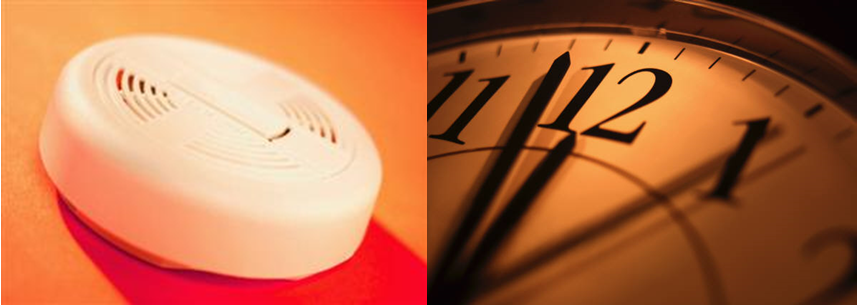Daylight Saving Time Ends Sunday, Nov. 5 - Change Your Clock, Change Your Smoke Alarm Battery

Daylight Saving Time ends Sunday, November 5. As you turn your clocks back, the Prince William County Fire and Rescue System would like to remind residents to change the battery in their smoke alarms. When properly installed and maintained, working smoke alarms save lives and protect against injury and loss due to fire. You double your chances of surviving a home fire with working smoke alarms compared to homes without working smoke alarms. (Smoke Alarms Save Lives).
Facts
NFPA’s Home Structure Fires (April 2023) & Fire Loss in the U.S. During 2021 (September 2022) states:
- 338,000 home structure fires occurred resulting in 11,100 injuries, 2,840 deaths, and over $8.4 billion in property loss.
- A home fire occurred every 93 seconds.
- Cooking was the leading cause of home fires and home fire injuries, while smoking materials was the leading cause of home fire deaths.
- Three out of five home fire deaths resulted from fires in homes without working smoke alarms or smoke alarms that failed to operate due to missing or non-functional power sources, missing or disconnected batteries, dead batteries and disconnected hardwired alarms or other AC power issues.
- No smoke alarms were present in more than one-third (41%) of the home fire deaths.
Safety Tips
Deadly house fires often occur late at night and early morning (11 p.m. – 7 a.m.) when individuals are sleeping. Therefore, it is imperative that smoke alarms be properly installed and maintained to protect against injury and the loss of life. To keep you and your family safe follow these life-saving smoke alarm tips:
- Place a smoke alarm on every level of your home, including the basement, in every bedroom and outside each sleeping area.
- Test smoke alarms monthly by pushing the test button. If you cannot reach the button easily, use a broom handle.
- When a smoke alarm sounds, get outside and stay outside.
- Call 911 once you’re safely outside.
- DO NOT remove the batteries from your smoke alarms to put in other appliances.
- Replace all smoke alarms in your home every 10 years or sooner if they don’t respond when testing:
- For smoke alarms with a non-replaceable battery, replace the entire smoke alarm if it begins chirping.
- For smoke alarms with regular batteries, replace the batteries once a year when you change your clocks, fall back, spring forward, or before if the battery starts to chirp.
- Smoke alarms should be interconnected, so when one alarm sounds, they all do.
- Keep smoke alarms clean. Vacuum or dust your smoke alarms according to manufacturer’s directions to keep them working properly.
- Teach children what the smoke alarm sounds like and what to do in the event it sounds.
Smoke alarms can often sound while cooking or taking a shower that emits large amounts of steam. If a smoke alarm sounds during these types of activities, DO NOT remove or disable the battery; creating a minor fix can lead to a deadly mistake. Instead you should:
- Open a window or door and press the “hush” button,
- Wave a towel at the alarm to clear the air, or
- Move the entire alarm several feet away from the location.
Smoke Alarms for the Deaf and Hard of Hearing
There are special designed smoke alarms for the deaf and hard of hearing, i.e. vibrating alarms or visual alarms equipped with flashing strobe lights. It is vital that this audience is aware of the availability of these types of smoke alarm devices as well as the importance of a proper escape plan.
For more information on smoke alarms for the deaf and hard of hearing, contact the Hearing and Loss Association of America at 301-657-2248 or visit www.hearingloss.org/.
Additional Safety Tips
In addition, we urge families to develop and practice, regularly, a home fire escape plan and be sure everyone in your household knows what the smoke alarm sounds like, what to do and where to go in the event there is a fire.
*Note: When changing the batteries in your smoke alarm, it’s also important to change the batteries in your NOAA All Hazard/Weather Radio. Hazardous weather conditions can develop at any time – Be Prepared! Preparation is your best defense!
For more information on smoke alarm safety, visit the National Fire Protection Association www.nfpa.org and the U.S. Fire Administration www.usfa.fema.gov.
For additional information on home fires, visit NFPA’s Home Structure Fires (April 2023) and Fire Loss in the United States During 2021.